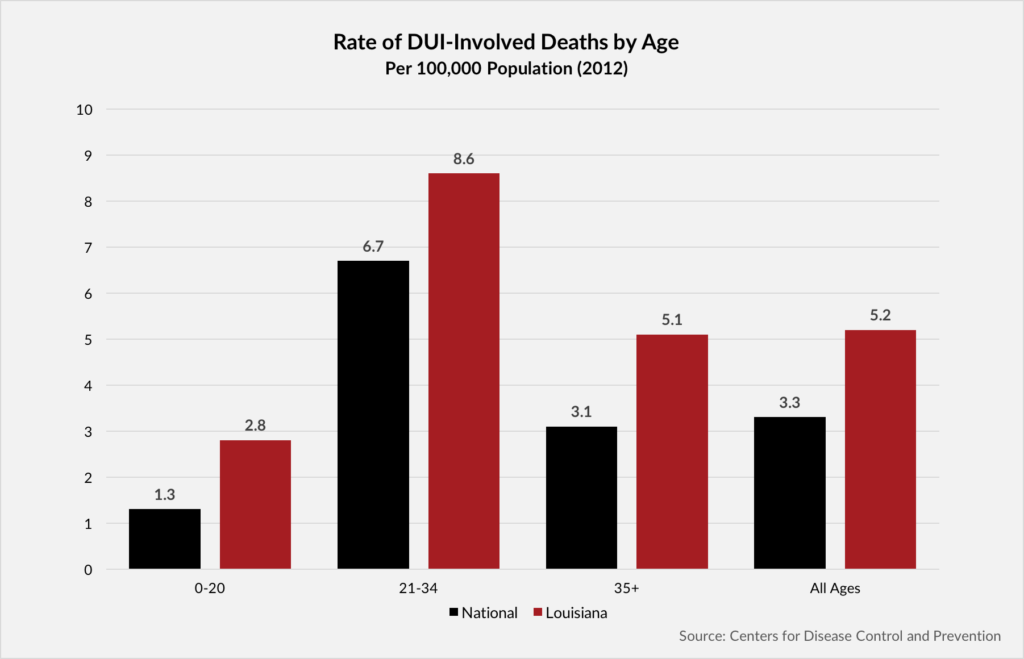New Orleans DUI Accident Lawyer
When people get drunk or high and cause accidents, they are usually arrested and punished for their negligence.
The New Orleans DUI accident lawyers at the Law Office of John W. Redmann, L.L.C. have more than two decades of experience representing clients who have been injured or lost family members in accidents caused by intoxicated drivers.
Holding Drunk Drivers Responsible
Our New Orleans car accident attorneys help motor vehicle accident victims and their families get justice and compensation following drunk- or drugged-driving crashes involving cars, trucks, commercial semis, boats, ATVs, motorcycles, heavy equipment and other vehicles. We also hold third parties accountable when they sell or supply alcohol or drugs to people who later cause injuries. Such parties may include bars, taverns, restaurants, party hosts, pharmacists, physicians or others who illegally provide substances that play a role in an accident.
New Orleans Drunk Driving Accident Resources:
- New Orleans DUI Statistics
- Louisiana Drunk Driving Laws
- What Compensation Can I Get for a DUI Claim?
- What to Do After a Drunk Driving Accident
- Do I Need a DUI Accident Lawyer?

As experienced personal injury attorneys, we understand how spinal cord injuries, traumatic head injuries, brain injuries, and other losses of cognitive and physical functions can devastate the emotional, psychological and financial health of an accident victim. We also understand the emotional toll such injuries can take on a family. We help our clients recover money so they can pay their current and ongoing hospitalization, rehabilitation, at-home nursing care, therapy and other medical bills, as well as to compensate them for pain and suffering, lost income, and lost future income due to disability.
Our law firm also seeks compensation for the survivors of deceased accident victims through wrongful death lawsuits. Our firm serves clients in Gretna, Metairie, and Greater Louisiana!
New Orleans DUI Statistics
DUIs in the United States are on an upswing, according to data from the National Highway Traffic Safety Administration. In 2016, 10,497 people lost their lives in drunken driving accidents. In Louisiana, driving under the influence claimed 225 lives within the same year.
Unfortunately, the Centers for Disease Control and Prevention reports that driving under the influence in Louisiana is more common than the national average. Nationwide, 1.9% of Americans admit to driving after drinking too much. Even more concerning is the higher 2.5% of Louisianans who admitted to the same.
About 1 in 3 traffic deaths in the United States occur as the result of drunk driving. Deaths related to operating under the influence are 100% preventable; there is absolutely no reason for anyone to drive intoxicated. The civil justice system plays an important role in protecting the rights of victims while holding offenders accountable for their negligence.

DUI Laws in Louisiana
A DUI conviction in Louisiana carries both administrative and criminal penalties. Like most other states, Louisiana considers 0.08% the threshold of impairment with regard to drunk driving. However, the legal limit for people under the age of 21 is a mere 0.02%. Additionally, officers may charge people with DUIs if they fail field sobriety testing and have other intoxicating substances in their system, such as illegal or prescription drugs.
The penalties for a DUI can be steep and involve fines, jail time, suspension or revocation of license, and more. Even though the impaired driver faces fines and charges from the criminal justice system, he or she may also face additional consequences under Louisiana’s tort system.
Civil Claims and the Criminal Justice System
Driving under the influence of alcohol or any other impairing substance is a crime. Louisiana law recognizes a Blood Alcohol Concentration of 0.08% or higher as criminally impaired and grounds for a DUI arrest. Along with criminal charges, a person charged with a DUI can expect to face other consequences, possibly including license suspension, license revocation, jail time, or mandatory installation of an ignition interlock device (IID), all depending on past charges and severity of charges.
When a person facing DUI charges faces fines, these fines are payable to the government, not the victim and his or her family. Victims of another’s criminal misconduct may be able to pursue a civil justice claim for compensation on top of any criminal penalties. A victim, or his or her family, can file a claim with the defendant’s insurance company to gain recompense for several different types of losses.
Types of Compensation in DUI Claims
A DUI often results in serious property damages, injury, or death. As a result, a victim or his or her family may be able to pursue several different types of damages.
- Economic damages seek to provide recompense for the tangible damages that result from the accident. Examples include payment of medical bills, the costs of ongoing therapy and rehabilitation, loss in income or earning capacity, and any other expense that may arise.
- General damages offer compensation for the intangible losses a plaintiff suffers as the result of an accident. Examples include loss in life quality, physical pain and suffering, and emotional anguish.
- In some cases, a victim or his family may be able to pursue punitive damages against the drunk driver. Such damages seek to punish the defendant for wrongdoing and prevent similar conduct in the future.
- When a person involved in a drunken driving accident dies, the surviving family members may be able to pursue a wrongful death action under Louisiana’s laws.
What to Do After a Drunk Driving Accident
Victims of DUI accidents have the right to file a claim in civil court to compensate for damages. However, his or her steps following an accident can directly affect the veracity and expedience of a potential personal injury claim. We recommend that victims take several important steps to protect any claim for compensation.
- Add a statement to the police report. Victims of DUI accidents may be too severely injured to stay on the scene and provide a statement for the responding police officer. However, he or she may request to add a statement to the report once he or she feels ready to do so. A victim can provide important context to the police report and provide an account of the circumstances that led up to the accident – for example, if the driver was drifting in and out of lanes or showing obvious signs of intoxication.
- Receive prompt medical treatment and follow any provider orders. Medical care is not only important to protect overall well-being, it also helps establish an official record of injuries. Victims should be thorough in their account of symptoms to a provider. Following a provider’s orders also helps protect the veracity of a claim to an insurer. If a victim prolongs the time before seeking medical treatment or does not follow a provider’s orders, it may create the appearance that the victim’s injuries were not in fact an issue, which could damage the potential for compensation.
- Do not sign any documents or agree to give recorded statements to an insurance company. Claims adjusters or insurers may approach and request permission to record a statement or even go through medical records in an attempt to negotiate a claim. Never agree to these terms unless a lawyer is present or approves. Unfortunately, some insurers will use this information to evaluate a claim for less than what it’s worth.
- Contact a personal injury attorney as soon as possible. Throughout the claims process, an attorney will represent a victim’s rights and demand compensation that’s commensurate with his or her injuries, pain, and suffering. The earlier the contact, the better; that way, an attorney can begin gathering evidence and understand your case on a deeper level.
Do You Need a DUI Accident Attorney?
The issue of fault in a drunken driving accident is usually clear. Operating under the influence of any intoxicating substance, whether it’s alcohol or a valid prescription, is against the law. In personal injury law, a person who operates under the influence commits negligence per se, which makes it simpler for victims of a drunken driving accident to collect compensation for their tangible and intangible losses. On the other hand, it’s still essential to have an attorney to represent your rights throughout the process.
An attorney is particularly useful when negotiating with insurance companies, as adjusters may attempt to evaluate a claim for far less than what it’s worth. Often, insurers will use victims’ lack of knowledge about the complex insurance system against them in an attempt to pay out as little as possible for a claim. Victims should recognize that insurers’ number one goal is to protect their own company assets – that is, pay out as little compensation as possible in accident and personal injury cases.
A lawyer will negotiate with an insurance company and hold them accountable for a policyholder’s actions. He or she will determine the full worth of a DUI claim and demand fair compensation for both the economic and general damages his or her client suffers.
Your New Orleans Drunk Driving Accident Attorney
The Law Office of John W. Redmann, LLC has been helping victims of DUI accidents in New Orleans for decades. We apply our experience and knowledge of applicable tort law to your case and demand fair compensation for your tangible and intangible losses. When a DUI results in loss of life, we help families gain financial recovery in line with Louisiana’s wrongful death laws. We hold insurers accountable for the actions of their policyholders, so you don’t have to suffer the consequences of someone else’s disregard for the law.
When another party’s negligence leads to catastrophic injury or significant damages, the Law Office of John W. Redmann, LLC is here to help. Contact us today to schedule a free initial consultation with our firm and discuss your legal options. We offer our legal services on a contingency-fee basis, so you will only owe attorney’s fees if we secure a settlement or court judgement on your behalf.